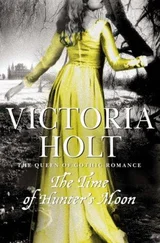"How dare you!" cried Kitty, and tears spilled from her wonderful eyes and ran down her cheeks.
"How dare you say those things about my mother! She was good ... good ... better than anyone else in the world, and I loved her...”
Kitty threw herself on to the bed and began to sob now as she I had been unable to sob since her mother's death. Harriet stared in dismay, first at the girl's shaking shoulders, then at her feet on the clean counterpane. She wanted to protest; she wanted to whip the girl; but she did neither; she just turned on her heel and hurried out of the room. In the corridor she paused. What a handful! Bess all over again! She would subdue the girl, though. She would force the wickedness out of her. just as she would have forced it out of Bess had she been old enough.
Kitty was stifled in that house. It seemed that everything she did was contrary to her aunt's wishes. At first she tried hard to please; she sat stitching with Harriet in the drawing-room until her head ached; she bent over the garden beds until her back ached; she worked in the still-room but hated the stains of fruit juice on her fingers, and she had no aptitude for the work.
How can she be so stupid! thought Harriet.
How can she care so much for all these things that do not matter, wondered Kitty. And she dreamed of Darrell, and thought of meetings in the wood, and of the day they would go to London together, for his Uncle Gregory had said he was too young to marry, and Darrell was hoping for support from his Uncle Simon in London.
"Wool gathering!" Harriet would snap.
"Head in the clouds! I do declare I've got an idiot for a niece.”
Kitty would merely smile and hug her secret to herself.
Insolent! Harriet would tell herself. Not a bit contrite! I believe she's laughing at me! But Kitty was not laughing at Aunt Harriet; she was only sorry for her. because she had no lover to meet in the wood and must spend all her enthusiasm on preserves and her kitchen garden.
Every evening at dusk she slipped out of the house. Darrell would be waiting for her in the wood. He would kiss her and fondle her. and she would look up into his face and think how good to look upon he was and how much older he seemed than the very young man she had first seen in the coach.
"Why!" he cried impatiently, 'do they put obstacles before us?
"Wait!" says my Uncle Gregory. How can we wait! Kitty, how can we?”
It was difficult. There she was before him. very young, desirable and desirous, Bess's daughter. Very soft and so ready to yield; he dreamed of the way she quivered when he put his hands on her shoulders. He loved her tenderly as well as passionately. He had written to his Uncle Simon in London, and Uncle Simon was more human, more understanding than Uncle Gregory. A large, red-faced man, Uncle Simon, whereas Uncle Gregory was tall and thin. Uncle Simon was a free thinker; he Meed to foregather with his cronies in coffee and chocolate I houses, and listen to the talk; he liked a carousal in a tavern; he liked women. Besides, he was ready to approve of anything of which Uncle Gregory did not. So Darrell had written a letter to Uncle Simon.
"She is beautiful," he had written, 'and we want to marry. Uncle Simon, we must marry At the moment we meet in a wood. She has a strict old aunt, and I have Uncle Gregory ..." He had tried to word it so as to make Uncle Simon laugh as well as to arouse his sympathy. He had great hopes of Uncle Simon." Still, he did not let his hands rest too long upon her shoulders, nor look too much at her red, soft lips; he tried not to notice how green was the grass and how soft and beautiful the bank, with the violets growing there. It seemed to him too that the birds were urging him to love, mocking him a little. There was a song of Shakespeare's that kept running through his head: And therefore take the present time.
With a hey, and a ho, and a hey nonino... For himself he would take all the present had to offer, but he! loved her very tenderly, and outside the wood with its soft; carpet of grass, its sheltering trees and mocking birds, the world! was a cruel place. ; The two girls, Peg and Dolly, knew of the meetings with Darrell, but there was nothing to fear from this. Kitty had given Peg a girdle of silk and Dolly a lace handkerchief, and no one had ever given them anything but advice and blows before. The clothes they had worn in the workhouse were payment for hard work; their board and lodging with Harriet were payment foil more hard work. But the girdle and the handkerchief were simply gifts, for she had given them, asking nothing in return. But even without the gifts they would have been on her side. She was beautiful and she was kind; they had no learning, but they did know it was natural to love. So they would carry messages for her. and whisper together about her, and try to be a little like her.
They had made constant use of the pump in the yard since the arrival of Kitty; they washed their garments. Peg wore the girdle on her quilted petticoat of flannel; Dolly carried the handkerchief tucked inside her bodice.
Two weeks passed in this way. The squire was a frequent caller. He sat in the garden and complimented Harriet on her flowers, and he studied her vegetables with what seemed like real interest. It could mean only one thing, thought Harriet, and she lay awake at night thinking of it.
She thought it was a pity that Bess had had to die just at this time and force on her the duty of looking after her daughter. For she did not understand Bess's daughter; she was almost rude to the squire, and he never seemed resentful, never even seemed to notice it. Sometimes he would look at her from under his bushy brows as though he were puzzled and interested but then, if you planned to marry a lady, you would be interested in her relations I Now and then, when Kitty was offhand with the squire and made Harriet cold with indignation and humiliation, he would turn to her, Harriet, and be so charming, almost like an accepted lover, as though he would teach the girl a lesson in good manners. It was gratifying, intensely so. Once she said to Kitty: "I do not understand you; you are positively unmannerly towards Squire Haredon!" And Kitty turned on her with flashing eyes, and cried out: "I hate that man!" Hate! What a word for a lady to use! And what had the squire ever been towards Kitty but indulgent, ready to overlook her rudeness?
"You will never find a husband if you persist in those manners, my girl!" she had said severely, for the girl was as vain as a peacock, and she thought that the best way of piercing her armour. And Kitty angrily turned on her with: "Your excellent manners did little to help you in that respect!" And then, just like Bess, all fury one moment and full of ridiculous demonstrations the next: "I'm sorry. Aunt Harriet. I didn't mean that, of course. I know ... there must have been people who would have liked to marry you ... if you had wanted them... but... I do hate Squire Haredon. I can't explain, but I do.”
And Harriet had said: "Indeed, you foolish girl, you cannot explain; but I will thank you to be more civil to my guests.”
It went on like that for three weeks, with the squire a constant visitor, until one hot afternoon, a lovely afternoon when the roses were at their best and the lavender was full of fragrance with the bees dancing a wild delight about it.
Harriet, from her sewing-room on the first floor, thought she heard the sound of carriage wheels on the road; she looked from her window, but the trees were too thick with leaves for her to see the road clearly now. She returned to her sewing. At any moment now Peg or Dolly would come to announce the arrivals of the squire, and perhaps this very afternoon he would ask the question which must have been on his lips for weeks now] perhaps for years.
But the expected tap on her door did not come, so, she told herself, it must have been someone else's carriage she had heard on the road. Feeling restive, she remembered how dry the dahlias had looked that morning. Poor things, they got little sun, tucked away near the summer-house. If she wanted a good crop, when the more spectacular flowers had faded she must give them a little care. She went downstairs and took her watering can. She heard voices as she approached the summerhouse.
Читать дальше












